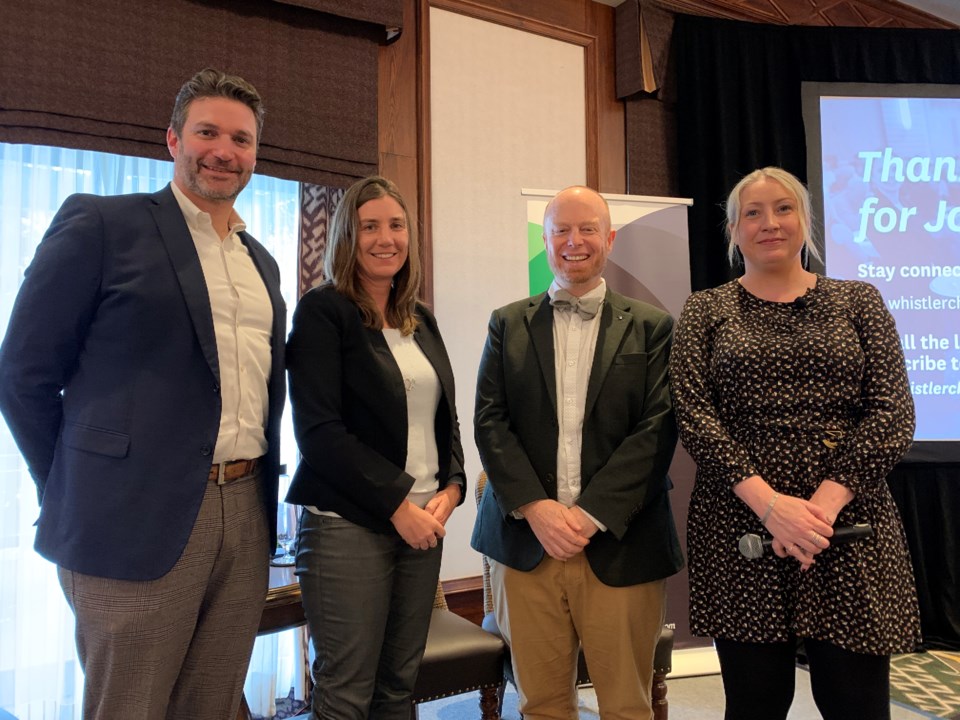The Whistler business community continues to be in a difficult position as inflation, rising taxation, a tight labour market, and the ongoing housing supply shortage combine to create a complex operating environment.
Whistler Chamber of Commerce executive director Louise Walker highlighted many of these concerns on April 2 at the Resort Municipality of Whistler’s (RMOW) Committee of the Whole meeting as she and Chamber chair Chris Vick discussed some of the challenges facing the local business community.
“The key issues that we are facing in business [is] obviously labour, and we’re all familiar with the biggest challenges with labour, [which] is housing or lack thereof,” Walker said.
Walker also touched on the concerns around access to affordable childcare and its impacts on businesses, a long pressing issue not just locally, but across B.C.
“We’re keen to get people back into the workforce, but with [the] lack of daycare in the community, it is creating a bit of a barrier, especially for women,” she said.
Like Whistler’s elected officials, the Chamber has been advocating for the introduction of a robust regional transit system that would link Mount Currie to the rest of the Sea to Sky and beyond.
“[Regional] transit, we’ve been working on this for a number of years. It gets employees to businesses, customers to businesses, people to social services, and it’s better for the environment,” Walker said.
In her presentation, Walker introduced the work the Chamber does and discussed some of the strategic priorities and programs the organization is currently undertaking, such as networking events, the return of the popular luncheon speakers series, the Whistler Experience Training Program, and advocacy on a range of important issues.
Comparing her earlier days in Whistler to current times, Walker noted how much worse the housing crisis has gotten in the last decade. Rising accommodation prices have resulted in workers becoming increasingly stressed, and many having to take on multiple jobs. That, in turn, has led to more residents leaving the resort for greener pastures in search of gainful employment.
“Employees feel like they don’t belong. They don’t have a secure home, and they’re not stress-free,” Walker said.
The labour shortage and rising business costs are also placing added stress on business owners. “It’s all adding up, so property taxes have increased, the cost of labour has increased, so it’s all just getting a bit too much,” she noted.
Walker pointed to the recently released statistics from the 2023 Vital Signs Report, noting the rise in mental-health calls and the astonishing increase in the resort’s average living wage, which rose from $25.37 per hour in 2019 to $30.80 an hour in 2023.
While ideal for workforce sustainability, paying a higher wage can be challenging for some businesses to cover without passing costs onto consumers, who themselves have already seen their wallets squeezed on several fronts.
“So, we really have to get to the heart of what’s impacting affordability and where we can all help,” Walker said.
Vick echoed the concerns around housing, adding that the chamber and the RMOW have a vital role to play in creating solutions.
“The business community is spending. Again, we’ll work on getting hard numbers, but I have about a half million dollars for my business in annual leases that I hold, and I’m not one of the biggest contributors,” Vick said. “It’s definitely in the millions, and it’s probably in the tens of millions that we’re spending competing with each other for the few housing resources that are there. I think there’s a big opportunity for the Chamber and business community to put that money to far more effective and impactful use,” he added.
One of the ways the Chamber aims to help address some of the challenges around the labour shortage is through the Whistler Community Talent Plan, designed to address employee recruitment and retention.
In addition to the talent plan, Walker said more data is needed to best understand the resort’s labour needs, what skill gaps need addressing, the demographics of foreign workers, and what support is required.
“We are looking to collect, analyse and share data because this can then help us with advocacy efforts. [It’s] much easier to see something if we can show a number that goes with it,” Walker said.
Whistler Mayor Jack Crompton believes data is one of the many areas in which the RMOW can work with the Chamber to solve some of the resort’s labour challenges.
“Getting into delivering a more robust Balance Model will be really helpful for us as we make decisions. We can always use additional data from local businesses; it makes better data models, to be sure, but we’ve got some useful stuff right now,” Crompton said.





